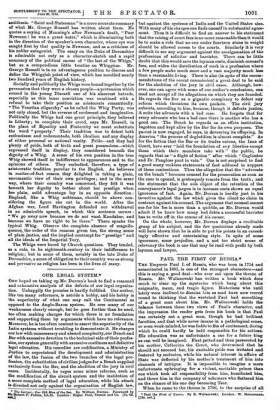OUR LEGAL SYSTEM.* ONE hoped on taking up Mr. Durran's
book to find a reasoned and exhaustive analysis of the defects of our legal organiza- tion. Unhappily the promise is hardly fulfilled. Our author, like too many reformers, is astride a hobby, and his hobby is the superiority of what one may call the Continental as opposed to the Anglo-Saxon system. He sees many of our weaknesses clearly enough, but he goes further than he need, too often making charges for which there is no foundation and supporting them by arguments which have no relevance. Moreover, he is too often content to assert the superiority of the Latin systems without troubling to demonstrate it. He charges our law with unnecessary and absurd complexity, our Bench and Bar with excessive devotion to the technical side of their profes- sion, our system generally with excessive costliness and defective - legal education. His remedies are codification, a Ministry of Justice to superintend the development and administration of the law, the fusion of the two branches of the legal pro- fession, the substitution of civilian judges for a Bench supplied exclusively from the Bar, and the abolition of the jury in civil cases. Incidentally, he urges some minor reforms, such as the modification of the circuit system and the institution of a more complete method of legal education, while his attack is directed not only against the organization of English law,
* The Laulier: Our Old Iran of the Sea. By William Darren. Foreword by Elie Robert P. Fulton, LL.D. London: Kegan Paul, Trench and Co. 17e. ed. Meta but against the systems of India and the United States also. With many of his charges one finds oneself in substantial agree- ment. Thus it is difficult to find an answer to his statement that the raising of court fees is no more reasonable than it would be to make a rule that no one under fourteen stone in weight should be allowed access to the courts. Similarly it is very difficult to see any argument against the amalgamation of the professions of solicitor and barrister. There can be little doubt that this would save the layman costs, diminish counsel's fees, and widen the distribution of work in a profession where a few people make much more and a vast majority much less than a reasonable living. There is also (in spite of the recom- mendations of the recent commission) a great deal to be said for the abolition of the jury in civil cases. Although, how- ever, one can agree with some of our author's conclusions, one need not accept all the allegations on which they are founded. He regards the Bar as a gigantic conspiracy to defeat any reform which threatens its own pockets. The civil jury subsists, according to him, because, though it defeats justice, it suits the advocate with a bad case. He forgets that for every advocate who has a bad case there is another who has a good one. The Bench he regards as an effete institution, begotten and kept alive by the Bar for its own purposes. The parent is now engaged, be says, in devouring its offspring. In America " the process of deglutition is almost complete." As for the fiction that the Bar or its trades unions, the Inns of Court, have ever "laid the foundation of any liberties except those which their members take with " the public, he regards that as " a flight of fiction " after which Cagliostro and Dr. Pangloss pant in vain." One is not surprised to find a good many reckless statements of fact adduced in support of these contentions. Thus the allegation that the " advocate on the bench" becomes counsel for the prosecution as soon as the case is opened, is grotesquely remote from the truth ; and the statement that the sole object of the retention of the conveyancer's legal jargon is to increase costs shows an equal ignorance of fact. Again, Mr. Durran is hardly just in his invective against the law which gives the client no claim in contract against his counseL The argument that counsel cannot sue for his fee is more than a quibble, as Mr. Durran would admit if he knew how many bad debts a successful barrister has to write off in the course of his career.
On the whole, however, Mr. Durran displays a creditable grasp of his subject, and the few quotations already made will have shown that he is able to put his points in an exceed- ingly effective and entertaining style. In spite of some ignorance, some prejudice, and a not too strict sense of relevancy the book is one that may be read with profit by both layman and lawyer.


























































 Previous page
Previous page